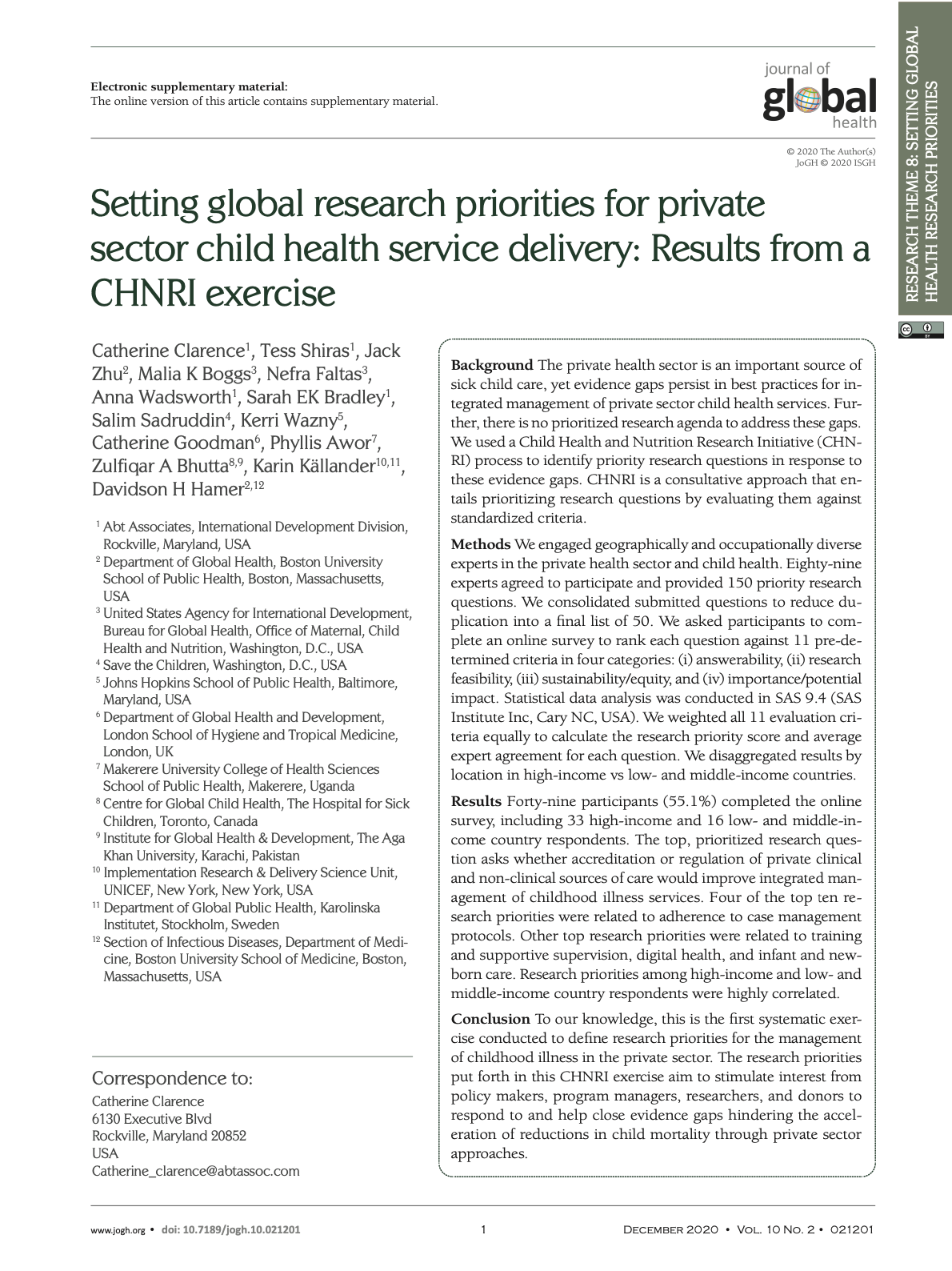Setting global research priorities for private sector child health service delivery: results from a CHNRI exercise
In 2020, USAID and SHOPS Plus collaborated to set global research priorities for private sector child health service delivery and published results in a recent Journal of Global Health article. The private health sector is an important source of sick child care, serving nearly half of sick children under five in USAID’s priority maternal and child health survival countries. However, a SHOPS Plus literature review conducted in early 2019 revealed that substantial evidence gaps persist in best practices for integrated management of private sector child health services.
To respond to these evidence gaps, SHOPS Plus and USAID used a systematic and democratic process to set a prioritized global research agenda for private sector child health service delivery. The process is called the Child Health and Nutrition Research Initiative (CHNRI). CHNRI was initially used in the child health and nutrition space but has since been adapted across numerous health fields. SHOPS Plus also collaborated with colleagues at Boston University who are well-versed in the CHNRI methodology.
The process engaged 89 child health and private health sector experts from programmatic, research, donor, government, policy, and implementation backgrounds. Ultimately, the CHNRI processed resulted in a prioritized research agenda that responds to major evidence gaps in private health sector approaches for integrated case management of childhood illness.
The CHNRI process
CHNRI is a consultative process through which a broad group of stakeholders identify and evaluate priority research questions for a particular topic. A rigorous analysis reveals which questions are the most highly ranked by the most stakeholders, resulting in a prioritized research agenda.
Steps in the CHNRI process
- Identify and invite experts to participate in the process
- Determine criteria against which participants evaluate all questions
- Ask experts to submit their ideas for priority research questions
- Consolidate and refine research questions to reduce duplication and overlap
- Field evaluation survey sent to experts, asking them to evaluate all submitted research ideas
- Analyze results
Priority research questions for private sector child health service delivery
The top five research questions from the CHNRI process are fundamental and relate to topics including accreditation of private providers, supportive supervision, adherence to clinical guidelines, quality of care, and non-clinical private providers such as those in drug shops or markets.
- Does accreditation or regulation of private clinical and non-clinical sources of care improve integrated management of childhood illness diagnosis, treatment, and appropriateness of testing and prescription?
- Can supportive supervision lead to improved quality of care in the private sector?
- What is the effectiveness of training private sector medicine vendors (i.e. private drug shops, pharmacists, chemists, patent medicine vendors, etc.) to recognize, manage and refer sick young infants?
- Can tools (flipchart, decision tree, and other job aids) used by private providers/pharmacies/drug shops improve adherence to child health protocols (diarrhea and pneumonia management, malaria treatment, and nutritional screening and counseling)?
- What are the key drivers of appropriate and inappropriate antimalarial and antibiotic prescription for children in for-profit sources of care by type of provider?

The purpose of research priorities put forth in this CHNRI exercise and published in the Journal of Global Health article is to stimulate interest from policy makers, program managers, researchers, and donors to respond to, and help close, the evidence gaps in child health service delivery through private sector approaches.
This process has made it clear that much more can be done to harness the expertise and reach of the private health sector to improve equitable access to lifesaving child health services and reduce millions of preventable childhood deaths each year.